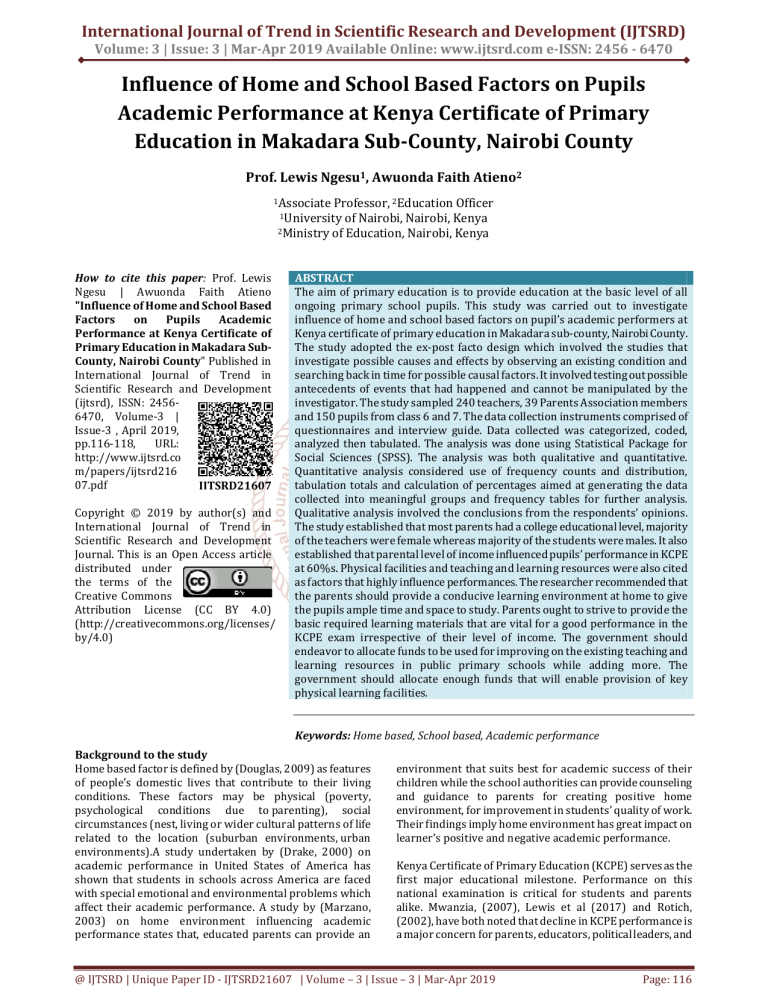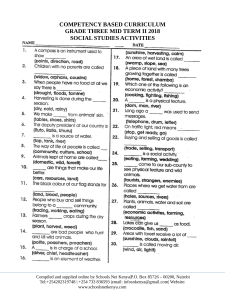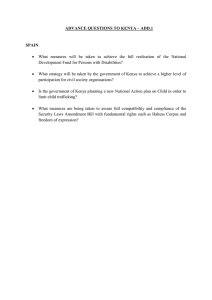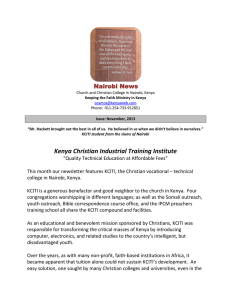
International Journal of Trend in Scientific Research and Development (IJTSRD)
Volume: 3 | Issue: 3 | Mar-Apr 2019 Available Online: www.ijtsrd.com e-ISSN: 2456 - 6470
Influence of Home and School Based Factors on Pupils
Academic Performance at Kenya Certificate of Primary
Education in Makadara Sub-County, Nairobi County
Prof. Lewis Ngesu1, Awuonda Faith Atieno2
1Associate
Professor, 2Education Officer
of Nairobi, Nairobi, Kenya
2Ministry of Education, Nairobi, Kenya
1University
How to cite this paper: Prof. Lewis
Ngesu | Awuonda Faith Atieno
"Influence of Home and School Based
Factors
on
Pupils
Academic
Performance at Kenya Certificate of
Primary Education in Makadara SubCounty, Nairobi County" Published in
International Journal of Trend in
Scientific Research and Development
(ijtsrd), ISSN: 24566470, Volume-3 |
Issue-3 , April 2019,
pp.116-118,
URL:
http://www.ijtsrd.co
m/papers/ijtsrd216
07.pdf
IJTSRD21607
Copyright © 2019 by author(s) and
International Journal of Trend in
Scientific Research and Development
Journal. This is an Open Access article
distributed under
the terms of the
Creative Commons
Attribution License (CC BY 4.0)
(http://creativecommons.org/licenses/
by/4.0)
ABSTRACT
The aim of primary education is to provide education at the basic level of all
ongoing primary school pupils. This study was carried out to investigate
influence of home and school based factors on pupil’s academic performers at
Kenya certificate of primary education in Makadara sub-county, Nairobi County.
The study adopted the ex-post facto design which involved the studies that
investigate possible causes and effects by observing an existing condition and
searching back in time for possible causal factors. It involved testing out possible
antecedents of events that had happened and cannot be manipulated by the
investigator. The study sampled 240 teachers, 39 Parents Association members
and 150 pupils from class 6 and 7. The data collection instruments comprised of
questionnaires and interview guide. Data collected was categorized, coded,
analyzed then tabulated. The analysis was done using Statistical Package for
Social Sciences (SPSS). The analysis was both qualitative and quantitative.
Quantitative analysis considered use of frequency counts and distribution,
tabulation totals and calculation of percentages aimed at generating the data
collected into meaningful groups and frequency tables for further analysis.
Qualitative analysis involved the conclusions from the respondents’ opinions.
The study established that most parents had a college educational level, majority
of the teachers were female whereas majority of the students were males. It also
established that parental level of income influenced pupils’ performance in KCPE
at 60%s. Physical facilities and teaching and learning resources were also cited
as factors that highly influence performances. The researcher recommended that
the parents should provide a conducive learning environment at home to give
the pupils ample time and space to study. Parents ought to strive to provide the
basic required learning materials that are vital for a good performance in the
KCPE exam irrespective of their level of income. The government should
endeavor to allocate funds to be used for improving on the existing teaching and
learning resources in public primary schools while adding more. The
government should allocate enough funds that will enable provision of key
physical learning facilities.
Keywords: Home based, School based, Academic performance
Background to the study
Home based factor is defined by (Douglas, 2009) as features
of people’s domestic lives that contribute to their living
conditions. These factors may be physical (poverty,
psychological conditions due to parenting), social
circumstances (nest, living or wider cultural patterns of life
related to the location (suburban environments, urban
environments).A study undertaken by (Drake, 2000) on
academic performance in United States of America has
shown that students in schools across America are faced
with special emotional and environmental problems which
affect their academic performance. A study by (Marzano,
2003) on home environment influencing academic
performance states that, educated parents can provide an
environment that suits best for academic success of their
children while the school authorities can provide counseling
and guidance to parents for creating positive home
environment, for improvement in students’ quality of work.
Their findings imply home environment has great impact on
learner’s positive and negative academic performance.
Kenya Certificate of Primary Education (KCPE) serves as the
first major educational milestone. Performance on this
national examination is critical for students and parents
alike. Mwanzia, (2007), Lewis et al (2017) and Rotich,
(2002), have both noted that decline in KCPE performance is
a major concern for parents, educators, political leaders, and
@ IJTSRD | Unique Paper ID - IJTSRD21607 | Volume – 3 | Issue – 3 | Mar-Apr 2019
Page: 116
International Journal of Trend in Scientific Research and Development (IJTSRD) @ www.ijtsrd.com eISSN: 2456-6470
provincial administration and community leaders. The
causes for the decline have been categorized into two that
include out of school and in school (institutional) related
factors. Institutional factors include; administration
effectiveness, teachers’ commitment to their teaching
students’ attitude to learning, social facilities among others.
Despite major strides made in education and training a
number of challenges still persist. At the heart of challenges
in Kenya is erratic parental involvement in learner’s
education; this has seriously affected retention rates in the
country. (Republic of Kenya, 2010). An earlier study done in
Kenya by (Mutuku, 2006, Lewis et al 2014, Kivuli, 2012) also
sought to find out factors influencing students’ performance
in Kenyan national examinations. The findings revealed lack
of commitment by teachers, instruction incompetence,
inability of administrators and educational officers, poor
relationship between teachers, learners and parents also led
to poor performance. A research carried out in Nairobi by
Ogola, (2010) examined parental factors that lead to poor
academic performance in primary schools in the County. The
study established that involvement of parents was one of
that most factors that affect the academic achievement of
primary school. Parent’s joblessness leads to difficulties in
paying school fees for their children. Inability to meet some
basic needs, irresponsible parenthood also contributes to
poor performance in Nairobi County.
Researchers and educators have long considered parent’s
involvement in their children’s education as a major
pathway to children success (Fullarton, 2004). Findings
based on those studies link parent involvement in their
children’s schooling to positive educational outcomes such
as greater learner, motivation to learn, better learner
behaviors in school, high student test scores and long term
achievement. The findings of (Fullarton, 2004), suggest that
differences in academic performance vary with parental
background, institutional environment and home
environment play a pivot role in learners’ academic
outcomes. Other studies focusing on parental level of
education have also revealed that the educational level of
learners’ parents (Robitaille, 2006, Schafer, 2009) home
educational resources (Mullis 2006), socio-economic status
of the parents (Nadenge et al 2016), and provision of quality
school work assistance by parents (Engheta, 2004), are some
of the major factors that can explain the variance in
academic achievement. (Okpala and Smith, 2005) cited the
findings of the studies done by (Hanushek, 1997) and
Fergusson, (1991) which indicated that the family
background of the learners affects their academic
achievement. Nevertheless, as resourceful as they are, these
studies have been carried out elsewhere especially in
developed countries, and limited data is available from
developing countries.
Statement of the Problem
Pupils declining performance in the KCPE examination has
been a major headache to all stakeholders in the education
sector including parents and teachers who are directly
involved in the learning process and outcomes. A significant
proportion of learners nationally tend to score very low
marks and fail to progress to secondary schools and
consequently discontinue from learning.
National
development can only occur if, pupils are able to complete
the education cycle from primary to secondary leavers onto
higher education of learning. A review of the literature
points to several gaps in the understanding of factors
affecting KCPE performance in Kenya. Although collective
studies done in primary public schools have established that
such factors like inadequate and relevant textbooks,
teachers’ qualification, and student background affect
performance in examinations, little research has been done
on the influence of home and school based factors on
students’ performance in KCPE examinations hence the need
for this study.
Data collection techniques
The study adopted the ex-post facto design that involve
studies that investigate possible causes and effect by
observing an existing condition and searching back in time
for possible casual factors. It involves testing out possible
antecedents of events that had happened and cannot be
manipulated by the investigator (Cohen and Manion, 1994,
Kerlinger, 1986). The sample size comprised of 39 P A.
members, 150 pupils and 240 teachers and data was
collected using questionnaires and interviews.
Results and discussions
The findings of the study revealed there was significant
relationship between parental level of education and pupils’
academic performance at KCPE with over 82.3% of the
respondents strongly/very strongly agreeing with the
statement. The study further revealed that parents with high
level of education motivated their children to do better in
school than parents with low level of education. The study
established statistically significant relationship between
parents’ level of income and pupils’ academic performance.
It was established to a certain degree that more income
meant better school life for children hence good
performance. The finding revealed that adequate
teaching/learning resources were prerequisite for good
academic performance. It was established to a large extent
that availability of classrooms, library, laboratory,
washroom, and playground was useful to their environment
hence if addressed; it will have an impact on helping them to
achieve better performances.
Conclusions
The performance of pupils at KCPE level is determined by
various factors. Some of these factors are home based while
others are school related. The combination of these factors if
not well addressed by policy makers and school
administration may impact negatively on pupils’
performance. Inadequate teaching and learning resources,
inadequate physical facilities, parental level of income and
education have a strong bearing on student academic
performance.
Recommendations
1. The parents should provide conducive learning
environment at home to give the pupils ample time and
space to study. This means that parents have a
responsibility to assist their children to do their
homework in a bid to impact on their KCPE
performance.
2. Parents ought to strive to provide the basic required
learning materials that are vital for a good performance
in the KCPE exam irrespective of their levels of income.
The parents should provide extra revision books or
question papers as a supplement to what the public
primary schools offer.
3. The Ministry of Education should endeavor to allocate
more funds to be used for improving on the existing
@ IJTSRD | Unique Paper ID - IJTSRD21607 | Volume – 3 | Issue – 3 | Mar-Apr 2019
Page: 117
International Journal of Trend in Scientific Research and Development (IJTSRD) @ www.ijtsrd.com eISSN: 2456-6470
teaching and learning resources in public primary
schools while adding more. Adequate staffing and
appropriate reading materials are key to improvement
of pupils’ performance.
References
[1] Cohen, L., &Manion, L. (1994). Research Methods in
Education. 3rd Edit. London: Routledge
[2] Douglas Burton-Christie. (2009). "Place-Making as
Contemplative Practice."Anglican Theological Reviews
91.(3) 347-371.
[3] Drake, D. (2000). Parents and Families as Partners in
the Education Process: Collaboration for the success of
students in public schools. ERS Spectruj, 34-35
[4] Engheta, C. M. (2004). Education Goals: results by
TIMSS-99 for participatingG8 countries.Nicosia:Cyprus
University 172-186.
[5] Ferguson, R. F. (1991). Paying for Public Education:
New evidence on how and why. Emerging issues policy
implication, PAR Nairobi, Regal Press Kenya Ltd.
[6] Fullarton, S. (2004).Closing the Gap between Schooling:
Accounting for variation in Mathematics achievement
in Australian schools. Nicosia, Cyprus University 2, 1631
[7] Hanustre, T. (1997). Assessing the Effects of School
Resources on Study Performance: An update, evaluation
and policy analysis. 19, 141-164
[8] Kerlinger, F. N. (1986). Foundations of Behavioral
Research, (3rd Ed), Holt Rinehart & Winston
[9] Kivuli, N. (2012). The influence of home and schoolbased factors on performance of
girls in science
subjects in K.C.S.E in Kilungu District in Makueni County.
Unpublished Med project report.
[10] Lewis, N.; Wachira, L. Kyule M. & Kivuli, E. (2014). The
influence of home and school related factors on
performance of girls in Science subjects in Kenya
Certificate of Secondary Education in Kilungu district
Makueni County-Kenya. International Journal of
Innovative Research and Studies, 3 (4) pp.888-897
Education with special reference to Biology. Journal of
Educational Research, 2 (3) pp 191-201.
[12] Marzano, R. J. (2003). What Works in Schools:
Translating Research into Action. Mathematics. Oxford,
Pergamum.
[13] Mullis, I. V. (2000).International Mathematics Report.
Boston, M. A: TIMSS Center College.
[14] Mutuku, E. R. (2006). A Survey of Factors Influencing
Poor KCSE Performance in Rural Secondary Schools: A
case study of Kithyoko Location, Machakos District.
Kenyatta University, PDGE project, Unpublished.
[15] Mwanzia, W. (2007, March 1). Time for Reflection as
Candidates Celebrate. Daily Nation.
[16] Nadenge, G.; Ngesu, L.; Muasya, I.; Maonga; T. & Maira,
M. (2016). Parental Socio-Economic Status and
Students’ Academic Achievement in Selected
Secondary Schools in Urban Informal Settlements in
Westlands Division, Nairobi County. International
Journal of Education and Social Science Vol. 3 No. 1; pp
43-55.
[17] Ogola O. F. (2010). Free education in Kenya’s Public
Primary Schools: Addressing the preschool
microsystems in Thika District, Kenya. Published Ph.D
Thesis. Kenyatta University.
[18] Okpala, C.& Smith, B. (2005).Understanding Urban
Education Today. Education and Urban Society: corn
Press Inc., 31, pp. 131-141
[19] Republic of Kenya.(2010). Economic survey, Nairobi;
Government Printer.
[20] Robitaille, D. E. (2006). The IEA Study of Mathematics:
Contexts and Outcomes of School Mathematics. Oxford,
Pergamum
[21] Rotich.B .K. (2002). The Role Family Social-Economic
Background in Students’ Academic Achievement; A case
study of Urban and sub-urban schools in Uasin - Gishu
district Nairobi, CUEA, unpublished.
[22] Schaeffer, D. (2009). Social and
Development. Belmont, CA: Wadsworth.
Personality
[11] Lewis, N. & Esther, N. (2017). A study of students’
performance in Kenya Certificate of Secondary
@ IJTSRD | Unique Paper ID - IJTSRD21607 | Volume – 3 | Issue – 3 | Mar-Apr 2019
Page: 118




